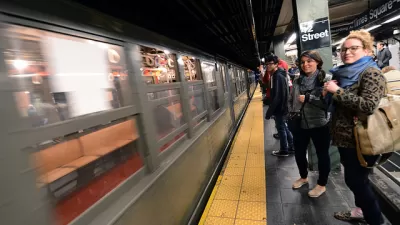The president's Fiscal Year 2019 Budget cuts the critical Capital investment Grants program run by the Federal Transit Administration. Projects lacking a full-funding grant agreement, like the Sacramento Streetcar, may fall victim.

Cuts to vital transit programs included in Trump's $4.4 trillion budget for Fiscal Year 2019, unveiled Feb. 12 (along with his infrastructure plan), threaten the financial viability of the four-mile Downtown/Riverfront Streetcar Project (see map), reports Tony Bizjak for The Sacramento Bee on Feb. 13.
The city has a preliminary agreement with the federal government for $50 million, about half the amount Sacramento has been hoping the federal government will ultimately provide for the proposed $200 million streetcar.
Local property owners in Sacramento have agreed to kick in a share, along with the cities of Sacramento and West Sacramento.
The streetcar project has lots of company in seeing its federal grant eliminated in Trump's 2019 Budget proposal "that would cut the Federal Transit Administration's annual capital improvement grants by nearly $1.4 billion, eliminate the Transportation Investment Generating Economic Recovery or TIGER grant program that Congress usually funds at $500 million a year, and slash $757 million in funding for Amtrak's intercity passenger trains while pushing states to make up the difference for long-distance service in their areas," according to Paul Skoutelas, President and CEO of the American Public transportation Association (APTA).
[See Planetizen: "Downtown Pittsburgh to Oakland BRT Moving Forward, With or Without Federal Money," Feb. 16.]
What makes streetcar backers nervous is that the project lacks a signed full-funding grant agreement. "[C]ity officials are pushing for that to happen before the end of this federal fiscal year when the Trump budget would go into effect if passed by Congress," adds Bizjak.
Trump made a similar proposal in his 2017 budget. Congress, however, chose to continue funding city rail projects. The recent passage of federal tax cuts, though, is expected to put pressure on Congress to reduce spending.
Bizjak also describes how Trump's budget also threatens Regional Transit's light rail extension to the Sacramento International Airport. In addition, the Trump administration, when they unveiled their long-awaited infrastructure plan, also on Feb. 12, "indicated it wants to provide only 20 percent of the funding for major transportation projects," adds Bizjak.
“I think this is the future of federal participation,” Sacramento Area Council of Governments head James Corless said on Monday. “The writing is on the wall for us as a region to get more creative with our local funding sources.”
In 2016, [Measure B,] a half-cent sales tax increase for Sacramento County transportation fell [0.96 percent] shy of the two-thirds support necessary to pass.
Hat tip to AASHTO Journal.
FULL STORY: How Trump’s new budget threatens Sacramento’s streetcar future

Planetizen Federal Action Tracker
A weekly monitor of how Trump’s orders and actions are impacting planners and planning in America.

Chicago’s Ghost Rails
Just beneath the surface of the modern city lie the remnants of its expansive early 20th-century streetcar system.

San Antonio and Austin are Fusing Into one Massive Megaregion
The region spanning the two central Texas cities is growing fast, posing challenges for local infrastructure and water supplies.

Since Zion's Shuttles Went Electric “The Smog is Gone”
Visitors to Zion National Park can enjoy the canyon via the nation’s first fully electric park shuttle system.

Trump Distributing DOT Safety Funds at 1/10 Rate of Biden
Funds for Safe Streets and other transportation safety and equity programs are being held up by administrative reviews and conflicts with the Trump administration’s priorities.

German Cities Subsidize Taxis for Women Amid Wave of Violence
Free or low-cost taxi rides can help women navigate cities more safely, but critics say the programs don't address the root causes of violence against women.
Urban Design for Planners 1: Software Tools
This six-course series explores essential urban design concepts using open source software and equips planners with the tools they need to participate fully in the urban design process.
Planning for Universal Design
Learn the tools for implementing Universal Design in planning regulations.
planning NEXT
Appalachian Highlands Housing Partners
Mpact (founded as Rail~Volution)
City of Camden Redevelopment Agency
City of Astoria
City of Portland
City of Laramie





























